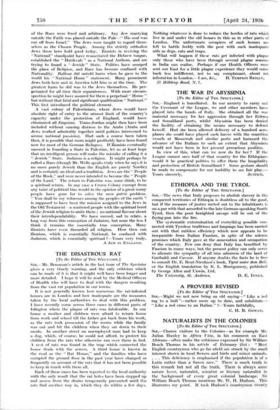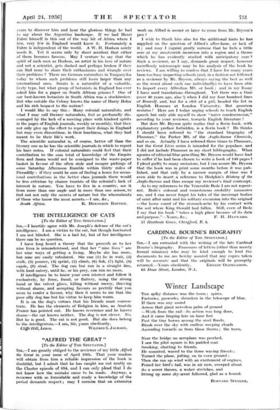NATURALISTS IN THE COLONIES
[To the Editor of THE SPECTATOR.] SIR,—Chance visitors to the Colonies—as for eirample Mr. Julian Huxley in Africa View, in his comment on East Africans—often make the criticisms expressed by Sir William Beach Thomas in his article of February 21st: "Most English countrymen who go far afield are struck by the small interest shown in local flowers and birds and minor animals.
• . . This deficiency is emphasised if the population is of a Latin rather than a Saxon race." There LS much truth in
this remark but not all the truth. There is always Some nature lover; naturalist, scientist or literary naturalist in the -background of every great colonial landscape: Sir William 'Beach Thomas mentions Mr. WI H. Hudson. This illustrates my point: It-took Hudson's coUntrinieii twenty years to discover him and hear the glorious things he had to Say about the Argentina landscape. If we had Henri Fabre himself in this out of the way bit of Africa where I lire, very few in England would know it. Fortunately a Fabre is independent of the world. A W. 11. Hudson sorely needs it. Yet it seems only by sheer accident that either Of them becomes famous. May I venture 'to say that the spirit of Such men as Hudson, an artist hi his love of nature and not a scientist, gets dashed and perhaps broken if they Cat: 'find none 'to share their enthusiasms and irrangle over their problems ? There are German naturalists in Tanganyika today to whom such problems still loom' larger than any international ones. Smuts is a naturalist Of -a valuable, lively type, but what group of botanists in England has ever asked him for a papet on South African grasses ? One of our best-known botanists in South Africa was stockbroker. But who outside the Colony knows the name of Harry Bolus and his rich bequest to the nation?
I would like to say this : Many colonial naturalists, and what I may call literary naturalists, feel so profoundly dis- couraged by the lack of a meeting place with kindred spirits in the pages of English journals, weekly or monthly, that they not only give up the effort to report their doings in England but may even discontinue, in their loneliness, what they had meant to be their life's work.
The scientific naturalist is, of course, better off than the literary one as he has the scientific journals in which to report his bare notes. If colonial naturalists could feel that their contribution to the sum total of knowledge of the Empire flora and fauna would not be consigned to the waste-paper basket in favour of the often stale and meagre pickings of some Saturday Afternoon Ramble within thirty miles of Piccadilly • if they could be sure of finding a home for occas- ional contributions in the better class journals there would be less criticism by chance tourists of the colonial's lack of interest in nature. You have to live in a country, see it from more than one angle and in more than one season, to find out not only the secrets of nature but the whereabouts of those who know the most secrets.—! am, &c., -



















































 Previous page
Previous page